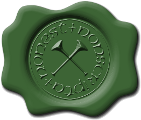
| Home | FAQs | Rules | Archives | Articles | Jobs | Links | KWHSS | OSCAR | SCA.org |
Collected Name Resources from LoARs (2010-present)
Articles from Juliana de Luna, Lillia de Vaux, and Alys Mackyntoich
- Iberian (Spanish, Portugeuse, and Arabic) -
December 2011 - Juliana de Luna Link to LoAR Cover Letter
Like most other parts of Europe, the Iberian peninsula (modern Spain and Portugal) was linguistically diverse in the Middle Ages and Renaissance. Most languages spoken on the peninsula are descended from Latin; the Iberian peninsula was fully integrated into the Roman Empire. In the western area, the language developed into modern Portuguese and Galician. In the central area, the language developed into modern Castilian (also called Spanish). In the east, it developed into modern Catalan. This is an oversimplification, as considerable linguistic variation continues to this day, but these define the major languages and the major language groups. In addition to the Romance languages, two other languages were important. Basque (also known as Vasco or Euskadi) was spoken in some parts of northeastern Spain. Arabic was spoken in the south from the Arab invasion in 8th century until the end of period (despite the conquest of the last Muslim kingdom in 1492 and the early 16th century expulsion of Muslims from Spain).
Articles for all these areas may be found at the Medieval Names Archives (http://www.s-gabriel.org/names/iberian.shtml and http://www.s-gabriel.org/names/occitan.shtml). For Portuguese, the earliest vernacular (as opposed to Latin) records show up around 1200, and my article "Early Portuguese Names" (at http://www.s-gabriel.org/names/juliana/earlyportuguese/) documents those forms. Both Aryanhwy merch Catmael and I have done research on later Portuguese names, which can be found at the first link above. For Castilian/Spanish, research spans a broader period of time. For names before 1200, I still go first to a print source: Gonzalo Diez Melcon's Apellidos Castellano-Leoneses: Siglos IX-XIII, ambos inclusive (Surnames from Castile and Leon: 9th to 13th centuries inclusive). It's a stunning set of data, and well indexed. Talan Gwynek published an index to the given names from it in the Known World Heraldic Symposium Proceedings in 1993; he has declined to revise it for online posting, but it's definitely worth finding. Otherwise, I tend to go to the articles, especially my "Spanish Names from the Late 15th Century"(http://www.s-gabriel.org/names/juliana/isabella/) and Elsbeth Anne Roth's "16th Century Spanish Names" (http://www.cs.cmu.edu/~kvs/heraldry/spanish16/). Each indexes thousands of names; other excellent articles include smaller datasets. For the Catalan-speaking areas, I start with Aryanhwy merch Catmael's "Catalan Names from the 1510 census of Valencia" (http://www.ellipsis.cx/~liana/names/spanish/valencia1510.html). In addition to the published data, I have several unpublished datasets for this area that cover the 14th and 15th centuries, so feel free to inquire if your clients are interested in that period.
For the non-Romance languages, we also have sources. Basque is problematic, as there are relatively few Basque language sources before 1600. But the names of Basque speakers were written down in Catalan and Spanish. Many are identical to the names of Spanish speakers, as some Basque names were adopted into Spanish and many Spanish names adopted into Basque. However, with that caveat, Karen Larsdatter's "Basque Onomastics of the Eighth to Sixteenth Centuries" (http://www.larsdatter.com/basque/) is a great introduction to these names. She includes in this article both elements that were used by Basques and elements that were Basque by origin but used by Spaniards. You can generally tell which are which by looking at her sources: citations from Diez Melcon are generally from outside the Basque-speaking area.
For Arabic names, I start with my "Arabic Names from al-Andalus" (http://www.s-gabriel.org/names/juliana/alandalus/) (al-Andalus is the Arabic name for the Islamic parts of the Iberian peninsula). This article includes data from a group of studies of Arabic names in the area. There are other great articles on Arabic names, but they focus on the Middle East proper, rather than explicitly on the Iberian peninsula. These Arabic names can be registered with or without all the diacritical marks (long marks, emphatic dots, etc.). For Jewish names, you need to focus on location, as Jews tended to use vernacular names as well as Hebrew/biblical ones. Therefore, the names of Jews in Catalan-speaking areas were not the same as those in Castilian-speaking areas. We don't have any studies of Portuguese Jewish names; I'd love any recommendations. For Castilian context, I use a mundane article by Lidia Becker, "Names of Jews in Medieval Navarre" (found at http://pi.library.yorku.ca/dspace/bitstream/handle/10315/3618/icos23_140.pdf?sequence=1) and Julie Kahan's "Jewish Women's Names in 13th to 15th Century Navarre" (http://www.s-gabriel.org/names/juetta/nav_intro.html). For Catalan contexts, I start with my "Jews in Catalonia: 1250 to 1400" (http://www.s-gabriel.org/names/juliana/catalan-jews/). Again, we have no sources for Jews in Arabic-speaking Spain. Therefore, I usually start with the information that we have from Jewish Cairo, including my "Jewish Women's Names in an Arab Context: Names from the Geniza of Cairo" and the sections about bynames that have been published in Known World Heraldic Symposium proceedings.
Back to Collected Name Resources from LoARsThe heraldry.sca.org site is copyright 1995-2024 Society for Creative Anachronism, Inc. The copyright of certain portions of heraldry.sca.org are retained by the original contributors as noted.
External links are not part of the heraldry.sca.org web site. Inclusion of a page or site here is neither implicit nor explicit endorsement of the site. Further, SCA, Inc. is not responsible for content outside of heraldry.sca.org. For information on how SCA uses collected and submitted data, please see the Privacy Policy.
Paper texture used with permission from GRSites.com.